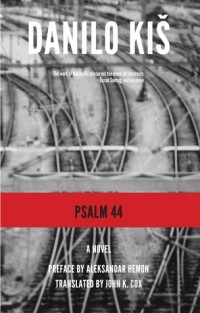 Psalm 44
Psalm 44
by Danilo Kiš
Dalkey Archive Press, 2012
128 pages / $16.95 buy from Dalkey Archive Press
Rating: 9.0
“The work of Danilo Kiš preserves the honor of literature.”
-Susan Sontag
In his Psalm 44, Danilo Kiš offers something beautiful and immediately important. The novel, set in the Auschwitz concentration camp, confronts deep tragedy.
As a writer, Kiš trends expansive, with long lyrical passages:
“She remembered the return from the village, and her perplexity at not traveling by train (the way they had come) and only then by cart through the fields of rye and poppies, but they covered the whole distance back in a cart, moving continuously alongside the tracks with their thundering haughty trains, and she loved travel by train, as did her mother, who had told her she had loved to travel by train, but just now she said she preferred to lurch along the bumpy village lanes, where there isn’t any way to shield your head and so the sun strikes you directly on the pate, right on the crown of your skull. Then they reached the city and Marija said to her mother that she’d had more than enough of this cart and that she would at least like to ride the streetcar at this pint, to ride the blue one that went from the train station straight to the corner of their street where the chestnut blossoms were…”
His expansiveness hones in on the poetry of everyday life and the pettiness of war. He deftly counteracts the deep currents in American culture that would make World War Two a romantic quasi-manichean struggle. For Kiš the conflict is a calculus of suffering and loss. As in Nicholson Baker’s Human Smoke, Kiš refuses to frame the war as anything besides an expression of pettiness and bigotry. He writes, “It is simply human intolerance that is searching for a pretext in skin color… it is the atavism of the horde and of the animal that seeks to overpower and annihilate all other species and all other creatures and to establish dominion and that triumphs for the most ordinary and egoistical reasons.”
This is a far cry from Saving Private Ryan, Band of Brothers, or the upcoming Monuments Men. Kiš resists the forces that would reduce human stories of intolerance into grandiose myth.
The long form of the novel also has the crucial benefit of exploiting compassion in a reader. Kiš combats what Sontag called “compassion fatigue,” and breaks through the blasé shell of techno consumerist bullshit whizzing around us at all times. Unlike a television newscast or a gritty war photo, a long text demands pause and self-interrogation.
For this, Psalm 44, provides a sort of social function, similar to Gass’s The Tunnel, or even Shoah. The novel reminds us what it is like to care about the suffering of others. Kiš documents a story of human loss and mourning in the face of needless violence. And this story continues to provide important perspective in a senseless and violent world. Such texts help us to process events like the 2012 Afghan massacre by Robert Bales, and the heartbreaking testimony of an Afghan father, “It’s like I’ve lost a part of my own body.”
At HTMLGIANT, Seth Oeulbaum consistently rails against complacency, and Psalm 44 provides more fuel for this effort. Some other recent works that help us confront the realities of American violence abroad today include Ghost Wars by Steve Koll, The Looming Tower by Lawrence Wright, War by Sebastien Junger, and Dirty Wars by Jeremy Scahill. Sometimes literature can help us be less terrible by serving up a winsome kick in the head. But it’s important to remember, “Compassion is an unstable emotion. It needs to be translated into action or it withers.”(Sontag)
Tags: Dalkey Archive Press, Danilo Kiš, Psalm 44
